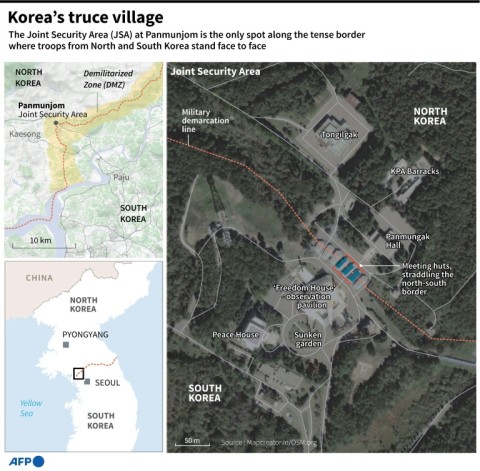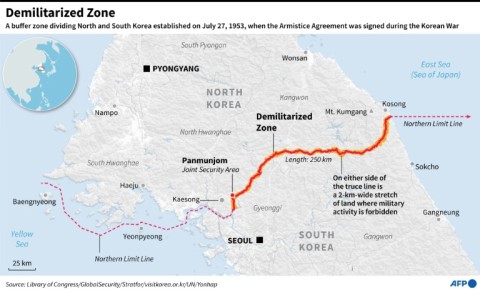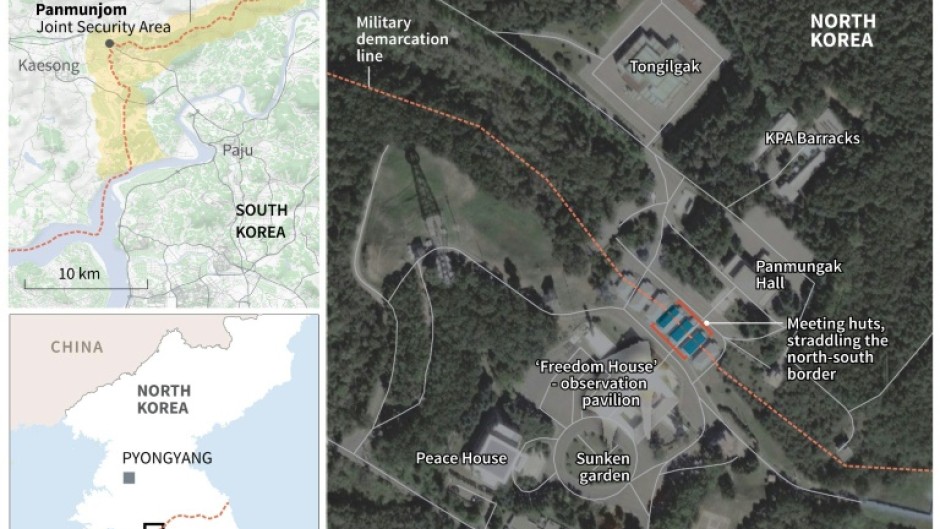SEOUL - Travis King defected to North Korea to escape "mistreatment and racial discrimination in the US Army", state media said Wednesday, Pyongyang's first official confirmation they were holding the American soldier.
A private second class with a chequered disciplinary record, King was due to fly back to America in July but instead slipped out of South Korea's main airport, joined a tourist trip to the DMZ and ran across the border into the North.
The United States has previously said that King crossed the border at the Joint Security Area in the Demilitarised Zone separating the North and the South "willfully and without authorisation".
Following a North Korean investigation, King "admitted that he illegally intruded", Pyongyang's Korean Central News Agency reported.
"Travis King confessed that he had decided to come over to the DPRK as he harboured ill feeling against inhuman maltreatment and racial discrimination within the US Army," KCNA said, referring to the North by its official name.
King "came to be kept under control by soldiers of the Korean People's Army" after he crossed the border, KCNA said.
"He also expressed his willingness to seek refugee in the DPRK or a third country, saying that he was disillusioned at the unequal American society," KCNA said, adding that a government investigation was still ongoing.
The United Nations Command, which oversees the armistice that ended fighting in the Korean War, confirmed last month it had begun a conversation with the North over King.

But US Secretary of State Antony Blinken said at the time that while contact had been made with the North Koreans, Washington still had no idea where King was or in what condition.
KCNA did not provide any details about King's health or location, or about what they planned to do with him.
- Propaganda opportunity -
North Korea's first official comment on King was pure propaganda, said Soo Kim, policy practice area lead at LMI Consulting and a former CIA analyst.
"King's crossing into North Korea provided the Kim regime an opportunity in several ways, the first of which is, of course, the potential for negotiations with the US over King's release," she told AFP, adding that Pyongyang were "tough negotiators", so it would not be easy for Washington to secure his release.
Pyongyang has a long history of detaining Americans and using them as bargaining chips in bilateral negotiations.
"It's also an opportunity for the regime propaganda to do its thing -- to spin the situation in such a way as to criticise the US and express Pyongyang's deep-rooted hostility towards Washington," she added.
Just before they issued their comments on King, KCNA put out a statement criticising discussion of Pyongyang's rights record at the United Nations, describing America as "the anti-people empire of evils, totally depraved due to all sorts of social evils".

"Not content with conniving at and fostering racial discrimination, gun-related crimes, child maltreatment and forced labour rampant in its society, the US has imposed unethical human rights standards on other countries and fomented internal unrest and confusion," the statement reads.
Vladimir Tikhonov, professor of Korean studies at the University of Oslo, told AFP that because King "is Black, I would imagine that he possesses certain propaganda value for North Koreans".
"The white racism and mistreatment of Blacks is a point North Korean propaganda traditionally emphasises, all the time since the Korean War, so King may be used to amplify this message," he said.
King crossing the border comes as relations between the two Koreas are at one of their lowest points ever, with diplomacy stalled and North Korean leader Kim Jong Un calling for increased weapons development, including of tactical nuclear warheads.
Seoul, Tokyo and Washington are set to hold a trilateral summit at the US presidential retreat in Maryland on Friday, during which the leaders are expected to announce plans for expanding military cooperation against Pyongyang's nuclear threats.
With their limited disclosure on King, North Korea is clearly "hoping or preparing for the issue to be raised in the trilateral meeting", said Yang Moo-jin, president of the University of North Korean Studies in Seoul.
"North Korea is emphasising that they hold the key to solving the problem," he told AFP, adding that the use of the term "illegal intrusion" was likely a bargaining tactic.
It "implies the possibility of deportation and can be used for negotiations between the North and the US".
cdl/ceb/smw
By Cat Barton And Claire Lee

